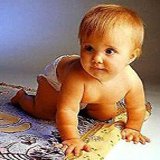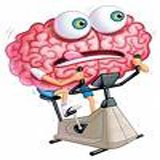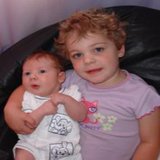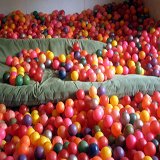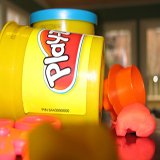Stimulating Baby Movements -
22 to 24 Months
Your childs improved balance and baby movements, coupled with his increased chest, hips and leg strength, give him the ability and confidence to attempt physical tasks that he could previously observe only passively, such as running, jumping, kicking, throwing and catching.
|
Naturally, he is still in the early stages of acquiring these particular fundamental movement skills, but he will make steady progress over the next few months with regards to general baby movements.
Suitable suggestions for Baby Movements
(22 Month Old - 24 Month Old)
Play Kid Games
To play kid games such as ball games can start to feature more, as he already have some hand eye coordination developed.
Have a range of balls of various sizes for him to play kid games with him.
When he tries to kick balls, you might find that he sometimes falls when he swings his leg his balance during these sort of toddler activities remains shaky but mostly he remains standing.
Encourage him to keep the upper half of his body steady while he kicks at the ball because this helps to keep his centre of gravity between his feet.
Kicking from a standing position is the easiest way for your toddler to get started. Kicking from a moving position is altogether more demanding for an enthusiastic 2 year old.
The chances are that when he first tries to walk up to a ball and kick it without stopping, hell simply trip over it!
Pick him up, dust him down, wipe away any tears, and suggest he tries again.
He Needs Plenty of Practice.
Gradually he will learn either to stop completely before he kicks the ball or to time his steps so that he can swing his leg at the ball without having to change stride.
This is a complex skill that takes time to achieve.
Make sure that your toddler has fun during these games; hell lose interest if it becomes too serious.
Throwing and Catching Games.
The lower your childs bottom is to the ground, the easier it is for him to throw and catch a ball (because of his low centre of gravity, which in turn increases his stability).
Practice both throwing and catching while he sits on the ground and use a medium-sized ball that he can grasp easily.
If you find that your child can manage these actions successfully from that position, hes ready to try catching and throwing while in a standing position.
Be prepared for your toddler to fall a few times, as his attempts to catch and throw push him off balance.
Again, regular practice is the key to play kid games and mastering these skills.
There are plenty of fun activities for kids and kid games to play that can be used to improve general baby movements.
Top Tips for Baby Movements
(15 Month Old - 18 Month Old)
- Play with him on a swing.
- Listen to music with him.
- Provide success.
- Expect occasional lulls in his progress.
- Promote his independence.
He enjoys the sensations of moving backwards and forwards on a swing, as long as he is securely fastened and cannot slip off.
He learns to adjust his balance continually as the swing moves in each direction.
Your toddler will happily dance to the rhythmic movement of his favorite song.
And he will try to imitate any dancer that he sees on television.
His enthusiasm increases if you dance along with him.
Have realistic expectations of your child's progress.
He needs to experience success in activities involving movement or his motivation will soon diminish.
When he does achieve something new, let him know how thrilled you are.
There will be temporary phases during which he makes almost no advance in his fundamental movement skills.
This happens with most children.
He will start to progress once again when he is ready for change.
Your child is now at the age (during the 22 month old development to 24 month old development phase) where he likes to do things for himself and you should encourage this.
He doesn't need you to fetch and carry for him - he can cope with many physical activities on his own.
Top Toys for a 22 Month Old - 24 Month Old
- ride-on toys with pedals
- soft balls and bean bags for throwing and catching
- outdoor garden play equipment
Be sure to browse through all the baby movements pages that is broken down in different age groups.
Find It!
Can't remember where you read something specific? Just type in your search term in the box below and your specific topic will be returned to you instantly.





